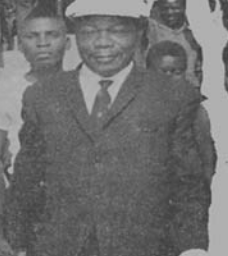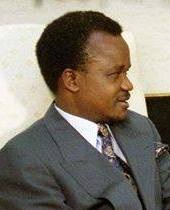 |
|---|
The United Progressive Party (UPP) was a political party in Zambia. The current president of the party is Saviour Chishimba.
 |
|---|
The United Progressive Party (UPP) was a political party in Zambia. The current president of the party is Saviour Chishimba.
The party was established by Simon Kapwepwe and several others who had left the ruling United National Independence Party (UNIP) in August 1971. [1]
On 21 December of the same year Kapwepwe, taking advantage of a by-election, became an MP for the UPP. Kaunda reacted swiftly; on 4 February 1972, he made the specious accusation that Kapwepwe was an instrument of the White Rhodesian, South African and Portuguese governments; Kapwepwe and 122 of his followers were arrested and the UPP was banned. Before the end of the year a one-party state was proclaimed, and Kaunda felt sure enough of his power to free Kapwepwe on 31 December. Kapwepwe retired from politics and only appeared briefly in 1978, when he and Harry Nkumbula stood for Zambia's one-party presidential nomination against Kaunda. Both Nkumbula and Kapwepwe were outmaneuvered by Kaunda, who secured the nomination while the two of them disappeared from Zambia's political scene.

Kenneth David Kaunda, also known as KK, was a Zambian politician who served as the first President of Zambia from 1964 to 1991. He was at the forefront of the struggle for independence from British rule. Dissatisfied with Harry Nkumbula's leadership of the Northern Rhodesian African National Congress, he broke away and founded the Zambian African National Congress, later becoming the head of the socialist United National Independence Party (UNIP).
The history of Zambia experienced many stages from colonization to independence from Britain on October 24, 1964. Northern Rhodesia became a British sphere of influence in the present-day region of Zambia in 1888, and was officially proclaimed a British protectorate in 1924. After many years of suggested mergers, Southern Rhodesia, Northern Rhodesia, and Nyasaland were merged into the British Federation of Rhodesia and Nyasaland.

The politics of Zambia takes place in a framework of a presidential representative democratic republic, whereby the president of Zambia is head of state, head of government and leader of a multi-party system. Executive power is exercised by the government, while legislative power is vested in both the government and parliament. Formerly Northern Rhodesia, Zambia became a republic immediately upon attaining independence in October 1964.

Northern Rhodesia was a British protectorate in south central Africa, now the independent country of Zambia. It was formed in 1911 by amalgamating the two earlier protectorates of Barotziland-North-Western Rhodesia and North-Eastern Rhodesia. It was initially administered, as were the two earlier protectorates, by the British South Africa Company (BSAC), a chartered company, on behalf of the British Government. From 1924, it was administered by the British Government as a protectorate, under similar conditions to other British-administered protectorates, and the special provisions required when it was administered by BSAC were terminated.

The president of Zambia is the head of state and the head of government of Zambia. The office was first held by Kenneth Kaunda following independence in 1964. Since 1991, when Kaunda left the presidency, the office has been held by seven others: Frederick Chiluba, Levy Mwanawasa, Rupiah Banda, Michael Sata, Edgar Lungu and the current president Hakainde Hichilema, who won the 2021 presidential election. In addition, acting president Guy Scott served in an interim capacity after the death of President Michael Sata.

The United National Independence Party (UNIP) is a political party in Zambia. It governed the country from 1964 to 1991 under the socialist presidency of Kenneth Kaunda, and was the sole legal party in the country between 1973 and 1990. On 4 April 2021, Bishop Trevor Mwamba was elected President of UNIP.

Elections in Zambia take place within the framework of a multi-party democracy and a presidential system. The President and National Assembly are simultaneously elected for five-year terms.
Mufulira, is a town in the Copperbelt Province of Zambia. Mufulira means "Place of Abundance and Peace". The town developed around the Mufulira Copper Mine in the 1930s. The town also serves as the administrative capital of Mufulira District.

The Zambian African National Congress was a political party in Northern Rhodesia dedicated to promoting the rights of black people.
The Northern Rhodesia Congress was a political party in Zambia.
Mainza Mathias Chona was a Zambian politician and founder of UNIP who served as the third vice-president of Zambia from 1970 to 1973 and Prime Minister on two occasions: from 25 August 1973 to 27 May 1975 and from 20 July 1977 to 15 June 1978.

Harry Mwaanga Nkumbula was a Zambian nationalist leader involved in the movement for the independence of Northern Rhodesia, as Zambia was known until the end of British rule in 1964. He was born in the village of Maala in the Namwala district of Zambia's southern province. He was the youngest of three children and the only son.
Simon Mwansa Kapwepwe was a Zambian politician, anti-colonialist and author who served as the second vice-president of Zambia from 1967 to 1970.

The Zambia Independence Act 1964 was an Act of the Parliament of the United Kingdom which granted independence to Zambia with effect from 24 October 1964. It also provided for the continuation of a right of appeal from Zambia to the Judicial Committee of the Privy Council. It was introduced by Andrew Cavendish, 11th Duke of Devonshire Under-Secretary of State for Commonwealth Relations
Christianity has been very much at the heart of religion in Zambia since the European colonial explorations into the interior of Africa in the mid 19th century. The area features heavily in the accounts of David Livingstone's journeys in Central Africa.

General elections were held in Northern Rhodesia on 20 and 21 January 1964. There were two voter rolls for the Legislative Council, a main roll that elected 65 seats, and a reserved roll that elected 10. Africans elected the main roll, whilst Europeans elected the reserve roll. Other ethnicities were allowed to choose which roll to be part of. The United National Independence Party won the elections, taking 55 of the common roll seats. Its leader, Kenneth Kaunda became Prime Minister, leading the country to independence in October that year, at which point he became President. Voter turnout was 94.8% for the main roll and 74.1% for the reserved roll.

General elections were held in Zambia on 19 December 1968 to elect the National Assembly and President. The first post-independence polls saw incumbent Kenneth Kaunda retain his post as president, whilst his United National Independence Party, the only party to field candidates in all 105 constituencies, won 81 of the 105 seats in the National Assembly. Voter turnout was 82.5% in the parliamentary election, but 87.1% in the presidential election.

General elections were held in Zambia on 31 October 1991 to elect a President and National Assembly. They were the first multi-party elections since 1968, and only the second multi-party elections since independence in 1964. The United National Independence Party (UNIP), which had led the country since independence, was comprehensively beaten by the Movement for Multi-Party Democracy (MMD). Kenneth Kaunda, who had been president since independence, was defeated in a landslide by MMD challenger Frederick Chiluba in the presidential elections, whilst the MMD won 125 of the 150 elected seats in the expanded National Assembly. Voter turnout was 45%.

General elections were held in Northern Rhodesia on 30 October 1962, with by-elections for several seats held on 10 December. Although the United Federal Party won the most seats in the Legislative Council, and Northern Rhodesian African National Congress leader Harry Nkumbula had made a secret electoral pact with the UFP, Nkumbula decided to form a government with the United National Independence Party.
Daniel Munkombwe was a Zambian politician. He worked as a political organizer and administrator for the ZANC in Northern Rhodesia before and after independence. He was elected to Parliament in 1973 and served for 19 years. In 2001, he was appointed Minister for the Southern Province by Levy Mwanawasa and continued in that and other government posts until 2015, having been subsequently appointed by Rupiah Banda and Michael Sata.